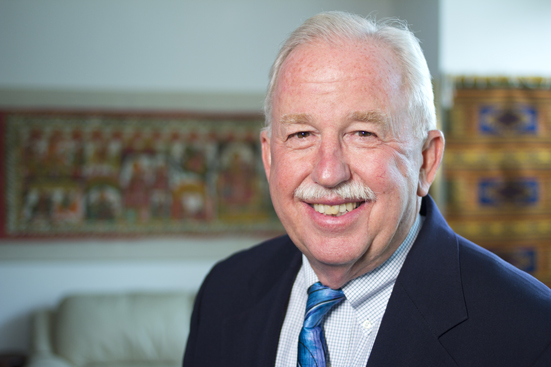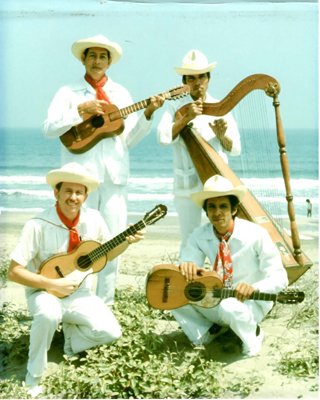
The Alliance for California Traditional Arts is proud to announce that our board chair and dear friend Daniel Sheehy has been awarded the 2015 Bess Lomax Hawes National Endowment for the Arts National Heritage Fellowship. The NEA’s National Heritage Fellowship is the nation’s highest honor in the field of traditional arts, and each year the Bess Lomax Hawes Award recognizes an individual who has made a significant contribution to the preservation and awareness of cultural heritage. (The award is named after Bess Lomax Hawes, a folklorist, arts advocate, former director of Folk and Traditional Arts at the NEA, and an ACTA co-founder and emeritus board member.) Currently, Sheehy is the director of Smithsonian Folkways Records and the award is merited through his years of dedication to the field as a curator, producer, promoter, advocate, scholar, and administrator. It must be noted, however, that he is also a longtime musician and practitioner.

Dan Sheehy has been practicing music since his youth in Bakersfield, playing in orchestra and marching band and reaching the rank of drum major in high school. His intention for college was to become a music educator, which changed upon his arrival to UCLA. It was there where he became integrated into a variety of musical practices and scenes that changed his perspective on what type of music needed to be shared with the populace. He immediately began studying west African drumming with master drummer Kwasi Badu, who happened to be Sheehy’s neighbor. He became a member of the Thunder Brothers, a dominantly black R&B soul group that played regularly in Compton. Sheehy also integrated into a scene of Mexican folk music on campus joining the Mariachi UCLAtlán, an ensemble composed of students that were highly interested in the variety of regional music that came out of Mexico.
 It was through many experiences with different music forms and musicians that Sheehy recognized that music education promoted a specific understanding and aesthetics of music, which was exclusive and dismissing of many forms and musical communities present in the lives of so many people. Coming to this realization, Sheehy committed himself to ethnomusicology, but more importantly to promote different ways of hearing music. He went on to do his graduate field work in Veracruz, Mexico, writing a very important dissertation, The “Son Jarocho”: The History, Style and Repertory of a Changing Mexican Musical Tradition, which became informative to many working in the field of Mexican and Latino folk forms. This work also became highly circulated among jarocho musicians and those learning to play the form, especially during the 1990s when jarocho music experienced a transnational cultural phenomenon with the resurgence of the fandango practice.
It was through many experiences with different music forms and musicians that Sheehy recognized that music education promoted a specific understanding and aesthetics of music, which was exclusive and dismissing of many forms and musical communities present in the lives of so many people. Coming to this realization, Sheehy committed himself to ethnomusicology, but more importantly to promote different ways of hearing music. He went on to do his graduate field work in Veracruz, Mexico, writing a very important dissertation, The “Son Jarocho”: The History, Style and Repertory of a Changing Mexican Musical Tradition, which became informative to many working in the field of Mexican and Latino folk forms. This work also became highly circulated among jarocho musicians and those learning to play the form, especially during the 1990s when jarocho music experienced a transnational cultural phenomenon with the resurgence of the fandango practice.
Committed to his mission to promote the “other” forms of music, through an invitation by one of his mentors, Bess Lomax Hawes, Sheehy went to Washington DC and joined the Folk and Traditional Arts division at the National Endowments of the Arts. Choosing to work in the public sector rather than in academia, he set forth to promote and advocate for artists in the field of traditional arts. Sheehy brought many musicians and forms, such as New Mexican musicians Roberto Martinez and jarocho musician Jose “Pepe” Gutiérrez, into the circles of folk festivals and national events, exposing them to new audiences to appreciate. He also influenced national policy by developing a National Task Force on Folk Arts in Education; a national assessment of progress in the folk and traditional arts; a survey of the preservation needs of vernacular dance in the United States; and an assessment of the 40 ongoing statewide apprenticeship programs in the traditional arts, to name a few achievements.
Sheehy productively contributed to a body of literature in ethnomusicology, anthropology, folklore studies, and Latina/o studies producing work such as:
2006 Mariachi Music in America: Experiencing Music, Expressing Culture. New York: Oxford University Press, 128 pages.
2005 “Latin American Musical Cultures,” in Music Cultures in the United States: An Introduction. Ellen Koskoff, ed. New York: Routledge, p. 243-272. Co-authored with Steven Loza, José R. Reyna, and Steven Cornelius.
1992 “A Few Notions about Philosophy and Strategy in Applied Ethnomusicology,” in Ethnomusicology, XXXVI/3 (Fall 1992), pps. 323-336.
1992 “Crossover Dreams: The Folklorist and the Folk Arrival,” in Baron, Robert and Nicholas R. Spitzer, editors, Public Folklore, Washington, DC: Smithsonian Institution Press, pps. 217-230.
and innumerous entries to the Garland Encyclopedia of World Music and New Grove’s Dictionary of Music.
Sheehy, prior to attaining his position with Folkways Recordings, was already building up an important body of recordings (field and studio) that contributed to the promotion and diffusion of Latino folk forms.
1994 Bien Jíbaro! Edwin Colón Zayas y su Taller Campesino. Rounder Records #5056, producer and descriptive notes. Traditional Puerto Rican música jíbara. Reviewed favorably in Billboard and elsewhere.
1989 Los Pregoneros del Puerto, long-play recording of traditional Veracruz musicians based in the United States. Rounder Records, co-producer and descriptive notes.
1979 Sones Jarochos, Vol. 1 of Music of Mexico series. Berkeley: Arhoolie Records. Co-producer of recordings and author of five pages of descriptive notes. Traditional music of Veracruz.
1979 Sones Huastecos: Los Caporales de Pánuco. Vol. 2 of Music of Mexico series. Berkeley: Arhoolie Records #3009. Author of five pages of descriptive notes. Traditional music of northwest Mexico.
1975 Traditional Music of Chile. Los Angeles: ABC Records, 1975. Co-producer of recordings and five pages of notes (with Manuel Dannemann).
As the director of the Folkways Recordings, Sheehy went on to produce an impressive library of work for which he garnered three GRAMMYs, one Latin GRAMMY, and six GRAMMY nominations. During this tenure he also created the Folkways Latino series, Tradiciones/Traditions, focused in identifying vibrant musical practices throughout Latin America and the United States.
Sheehy has contributed immensely to the promotion, diffusion, advocacy, and production of folk and traditional music within our nation and worldwide. He is no doubt an authority in the field, however, one of his best attributes is how he integrates the “people” he works with, be it the artists, informants, or staff, into the conversations. He often directs people, interested in him, to the artists and practitioners from whom he has learned so that others have the honor and opportunity to experience directly what he has experienced from these artists.
ACTA whole heartedly congratulates our mentor, colleague, board chair, and dear friend Dan Sheehy as the 2015 Bess Lomax Hawes NEA National Heritage Fellow!
On October 2, 2015, the 2015 NEA National Heritage Fellows were honored at George Washington University’s Lisner Auditorium in Washington, DC. An archived webcast of the concert is avavilable for viewing on the NEA’s website.
